| Srl | Item |
| 1 |
ID:
110834
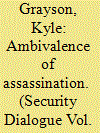

|
|
|
|
|
| Publication |
2012.
|
| Summary/Abstract |
This article begins by presenting a biopolitical account of assassination and targeted killing events carried out by liberal regimes. It argues that forms of political violence are understood and made meaningful beyond the administrative frameworks and technical rationalizations often privileged in biopolitical analyses. Deploying Alan Feldman's (1991) argument that political violence is an 'emplotted action' alongside William Connolly's (2005) notion of resonance, it provides a genealogical account of how forms of assassination have been positioned within Western cultural understandings of political violence. The focal point of examination is the biblical heroine Judith, whose story has resonated as a preferred narrative structure for understanding and (de)legitimating acts of assassination among Western publics. Through its reading of the book of Judith, the article highlights the importance of ambivalence for understanding assassination as a form of political violence. The legacy of the moral problematique enabled by Judith is then illustrated in relation to US President Barak Obama's May 2011 speech announcing the killing of Osama Bin Laden. The article concludes by suggesting that although the story of Judith may underpin contemporary assassination practices, it also offers a means of critically engaging with them.
|
|
|
|
|
|
|
|
|
|
|
|
|
|
|
|
| 2 |
ID:
137822
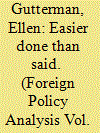

|
|
|
|
|
| Summary/Abstract |
The US Foreign Corrupt Practices Act of 1977 (FCPA) is having an unprecedented moment. In 2010, corporations paid $1.8 billion in FCPA fines, penalties, and disgorgements—the most ever recorded in this controversial Act's history and half of all criminal-division penalties at the Justice Department. While this recent pattern of enforcement is itself interesting, a deeper puzzle lies in the origins and early trajectory of the FCPA. Throughout the late 1970s and most of the 1980s, major US business groups opposed its unilateral ban on transnational bribery and lobbied the government to repeal this costly constraint on American businesses operating overseas. Yet, despite a decade of pressure from otherwise powerful groups, the government failed to respond to business demands amidst strategic trade concerns about the FCPA. Why? The paper applies a Constructivist lens, together with concepts from the theory of legal reasoning, to analyze the early history of the FCPA and explain its continued significance in US foreign economic policy. Anti-corruption norm resonance and the pressure publicly to justify norm-transgressing practices made foreign corrupt practices by American businesses “easier done than said.”
|
|
|
|
|
|
|
|
|
|
|
|
|
|
|
|
| 3 |
ID:
119232
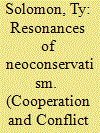

|
|
|
|
|
| Publication |
2013.
|
| Summary/Abstract |
Since 2003, scholars and pundits alike have vigorously debated the role of neoconservatism in the run-up to the US invasion of Iraq. Few, however, have examined the power of neoconservatism in terms of its resonance on an affective level. To more fully understand the influence that neoconservatism has had in recent US foreign policy debates, this article argues that scholarly analyses should also examine what could be termed its discursive efficacy. Neoconservatism incorporates many images and symbols of what many Americans would consider as being 'American', and the affective force of this discourse is vital in understanding its resonance with audiences. Employing insights from psychoanalytic theory, this article argues that a critically under-examined aspect of neoconservatism's varying influence on US foreign policy debates is found in the kinds of identifications that it offers audiences. The article, in this sense, contributes to the growing literature on neoconservatism, and raises the under-explored issue of resonance for the study of security discourses.
|
|
|
|
|
|
|
|
|
|
|
|
|
|
|
|
| 4 |
ID:
117667
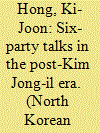

|
|
|
| 5 |
ID:
169163
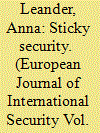

|
|
|
|
|
| Summary/Abstract |
In security studies and beyond, technological developments are associated with technocratic, rationalistic, transparent forms of security governed from a distance. In much of the advertising of tracking devices the associations made are very different not to say opposed to this. The advertising composes security anchored in sensemaking and resonance rather than calculus and reason, working from within and below rather than from a above at distance and depending on the negotiation of opaque co-presences rather than the establishment of precision and transparency. The consequence is that advertising not only extends but also deepens the grip of military/security matters: making them sticky. Moreover, the heterogeneity of the elements is such that what is composed is a shifting collage rather than a stable composition. This argument makes a threefold contribution to security studies: a theoretical reconceptualisation of what it means to compose security, an empirical intervention in the debates surrounding the politics of tracking devices and a methodological intervention in favour of collaborationist research strategies.
|
|
|
|
|
|
|
|
|
|
|
|
|
|
|
|